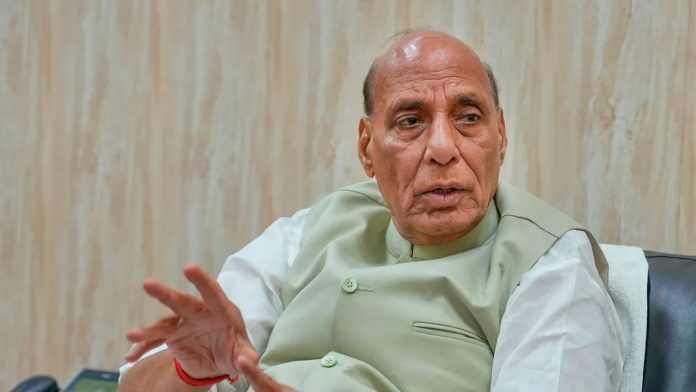‘Talks with China going on well’
NEW DELHI, May 5: India will never give up its claim on Pakistan-occupied-Jammu Kashmir (PoJK) but it won’t have to capture it with force because its people, on their own, would want to be part of India after seeing the development in Kashmir, Defence Minister Rajnath Singh has said.
In an exclusive interview to PTI, Singh asserted that the ground situation has improved significantly in Jammu and Kashmir and that a time will come when AFSPA (Armed Forces Special Powers Act) will no longer be required in the Union Territory.
The Defence Minister, however, said the matter is under the domain of the Union Home Ministry and it will take appropriate decisions. He said elections will also be held there definitely, but wouldn’t give a timeline.
“I think India will not have to do anything. The way the ground situation has changed in Jammu and Kashmir, the way the region is witnessing economic progress and the way peace has returned there, I think demands will emerge from people of PoK that they should merge with India,” he said.
“We will not have to use force to take PoJK as people would say that we must be merged with India. Such demands are now coming,” he said. The Defence Minister asserted that “PoJK was, is, and will remain ours”.
Follow the Daily Excelsior channel on WhatsApp
Citing improvement in the ground situation in Jammu and Kashmir, Singh said Assembly elections will be held there soon, but did not give a timeline.
“The way the situation is improving in Jammu and Kashmir, I think a time will come when AFSPA will no longer be required there. It is my view and it is for the Home Ministry to decide on it,” he said.
The AFSPA empowers security forces to conduct operations and arrest anyone without any prior warrant. It also gives immunity to the forces if they shoot someone dead.
The Defence Minister, referring to Pakistan’s proxy war in Jammu and Kashmir, said Islamabad must stop cross border terrorism. “They are trying to destabilise India and we will not allow it to happen,” he said.
Singh asserted that India will keep focusing on combating cross-border terrorism.
As the military standoff between India and China drags on along the Line of Actual Control (LAC) in eastern Ladakh, Rajnath said the talks between the two sides are going on well and indicated hope for a resolution of the lingering row.
Singh also said that India has been developing infrastructure along the frontier with China at a rapid speed, asserting that the country’s borders will remain safe.
“The talks are going on well,” he said declining to elaborate further considering the sensitive nature of the dialogue process.
Asked whether he was hopeful of a positive outcome and an end to the nearly four-year face-off between the two militaries, Singh shot back: “If there was no hope, then why to have talks.”
“They (the Chinese side) also have hope and that is why holding the talks,” he said.
The Defence Minister also took a potshot at the Congress for continuously targeting the Government on the eastern Ladakh standoff.
“They (Congress) are questioning the bravery of Indian soldiers … Who are you demoralising? What is your intention? I can also go back to 1962 as well,” he said.
The theaterisation process in the military is making progress as consensus is emerging among the three services on the ambitious initiative, Rajnath said in first clear remarks reflecting forward movement in the mega reform initiative.
He said the armed forces are committed to the theaterisation initiative because it will integrate the capabilities of the three services and ensure better utilisation of resources.
Under the theaterisation model, the Government seeks to integrate the capabilities of the Army, Air Force and Navy and optimally utilise their resources for wars and operations.
“The theaterisation process has started. There has been progress on it. Consensus is emerging on it among the three services as it will ensure better utilisation of resources and enhance the military’s overall capabilities,” the Defence Minister said.
Singh declined to provide a timeline for rolling out of the theatre commands, and said it took close to 20 years in certain countries where theaterisation plan was implemented.
“We are working on it,” he said, refusing to share more details on the mega project.(PTI)


